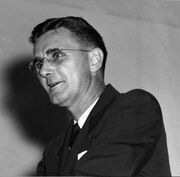
Governor-General Richard Mason.
The New Day was a period in the history of the Confederation of North America that coincided with the administration of Governor-General Richard Mason. The period was characterized by a national mood of guilt over failing to intervene in the Global War, and over having escaped the widespread death and destruction that engulfed the rest of the world as a result. The period also saw political polarization between Mason's supporters and opponents, and the creation of a massive foreign aid program called the Mason Doctrine aimed at repairing the damage inflicted by the war. The New Day was part of the larger global historical era called the War Without War.
The term "New Day" comes from a vitavised speech given by Mason on 30 November 1953 in which he spoke movingly of the desolation he had seen during a world tour. Mason broke down at the end of the speech while saying, "We must lead the world to a new day." This gave a name not only to Mason's programs, but also to the national mood of the C.N.A. in the 1950s. In this sense, it can be argued that the New Day era actually began in March 1949, when Mason first proposed his international aid program while serving in the Grand Council.
Sobel compares the New Day era unfavorably to the Diffusion Era of the 1920s. He says that Diffusionism, as symbolized by the Galloway Plan, was rational, well-considered, and led by people with an ability to isolate a problem, find an answer, and organize to achieve results. He says that by contrast, the New Day movement was highly emotional, erratic, and illogical, or even anti-logical, and was led by poets and artists rather than politicians and businessmen. Sobel also contrasts Owen Galloway's unemotional speaking style to that of Mason, which he characterizes as "emotional and erratic."
Sobel also emphasizes the ingratitude of the foreign recipients of Mason Doctrine aid, describing North American visitors to Europe being jeered at, spat upon, and in some cases, beaten. He also quotes an editorial from the London Times which advises potential aid recipients to "kill a few North American tourists and aid officials, and call Mason a criminal" in order to receive more aid. In addition, Sobel speaks of the Germans using Mason Doctrine aid for military purposes by 1956, and of other countries demanding outright military aid.
Mason's domestic critics, notably New York Herald editor Jeffrey Martin, found it difficult to understand the national mood of the New Day period. Sobel compares Martin and other critics to the only sober people at a drunken orgy, trying to discuss serious matters with individuals in a state of advanced inebriation, so that the two would simply talk past each other , with neither understanding the other. Sobel quotes a German visitor to the C.N.A. in 1956, who wrote, "There is a split in North American society that is simply fascinating. One walks down the streets and sees two kinds of people. One is dresssed in sombre garb, the other in the most colorful garments imaginable. The former, of course, is a critic of the Administration, the latter a Mason disciple. One need not speak with them to discover this." Another visitor wrote, "In North America the anti-Mason people work hard to produce the goods the New Day people give away to foreigners. It is a division of labor that works well, yet each group hates the other."
Martin took advantage of the emotionalism of the times even as he decried it. At the 1958 People's Coalition convention in Norfolk, Virginia, Martin was able to gain the nomination for governor-general thanks to the frenzied support of rank-and-file Coalition members. In a campaign marked by parades, vitavised political programs, and what Sobel describes as "much ballyhoo," Mason won a narrow victory over Martin that served to further polarize the country between New Day supporters and opponents.
By the early 1960s, a new generation of voters had appeared that had not lived through the debates of the 1930s, and barely remembered the Global War. To them, the clashes over the Mason Doctrine seemed irrelevant. Mason himself came to share their beliefs, so that when Kramer Associates tested an atomic bomb in June 1962, Mason refused to initiate a rival North American atomic bomb project, instead accepting K.A.'s atomic monopoly and enforced global prohibition on war as a fait accompli.
Mason's atomic policy lost him the support of much of his own Liberal Party, and he was barely able to gain the Liberal nomination for governor-general at the 1963 convention. He attempted to mobilize the support of the new generation of voters by creating the Justice Brigades, but they proved too few to affect the outcome of the election, which was won by Coalition candidate Perry Jay.
Sobel's sources for the New Day include Mason's own The New Day (Burgoyne, 1957); as well as Percival Prime's Letters from North America (London, 1957); Frank Rusk's Statistical Analysis of the 1958 C.N.A. Elections (New York, 1962); Carl Krauss's The Messianic Trend in Twentieth Century C.N.A. (New York, 1969); and the 5 January 1950, 30 April 1957, and 15 March and 28 March 1961 issues of the New York Herald.
This was the Featured Article for the week of 11 May 2014.
| C.N.A. Historical Eras |
|---|
| American Crisis • North American Rebellion • Four Viceroys • Britannic Design • Dickinson Era • Trans-Oceanic War • Era of Harmonious Relations • Crisis Years • Rocky Mountain War • Era of Faceless Men • Age of Renewal • Bloody Eighties • Creative Nationalism • Starkist Terror • Years of the Pygmies • Malaise Years • Diffusion Era • Global War • New Day • War Without War |
